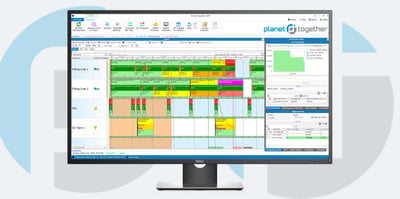IoT for Optimal Production Planning
As an Operations Director, you understand the critical role of efficient production planning in meeting regulatory requirements, maintaining quality standards, and optimizing resource utilization. With the advent of IoT (Internet of Things) technology, a new era of possibilities has emerged, promising to revolutionize production planning processes.
In this blog, we look into the integration of IoT with production planning systems like PlanetTogether and leading ERP, SCM, and MES platforms such as SAP, Oracle, Microsoft, Kinaxis, and Aveva. We explore how this integration empowers pharmaceutical manufacturers to achieve unparalleled efficiency, agility, and compliance.

Understanding IoT in Pharmaceutical Manufacturing
IoT involves connecting devices, sensors, and machines to gather real-time data and enable seamless communication and control. In the context of pharmaceutical manufacturing, IoT offers immense potential by providing visibility into various aspects of the production process. From monitoring equipment performance and environmental conditions to tracking inventory levels and ensuring regulatory compliance, IoT-enabled devices offer granular insights that can drive informed decision-making.

Integration with Production Planning Systems
The integration of IoT with production planning systems like PlanetTogether and enterprise-level platforms such as SAP, Oracle, Microsoft, Kinaxis, and Aveva amplifies the capabilities of both technologies. By seamlessly exchanging data between IoT devices and these systems, manufacturers can achieve enhanced visibility, predictive analytics, and automated decision-making.
Real-Time Monitoring and Optimization: IoT sensors deployed across manufacturing facilities continuously collect data on key parameters such as temperature, humidity, pressure, and equipment status. By integrating this real-time data with production planning systems, Operations Directors gain unprecedented visibility into the entire manufacturing process. They can monitor equipment performance, detect anomalies, and preemptively address issues to prevent downtime and ensure optimal production output.
Predictive Maintenance: One of the most significant benefits of IoT integration is the ability to implement predictive maintenance strategies. By analyzing data from sensors embedded in machinery, production planning systems can predict equipment failures before they occur. This proactive approach minimizes unplanned downtime, reduces maintenance costs, and extends the lifespan of critical assets. For example, by integrating IoT data with SAP's predictive maintenance capabilities, pharmaceutical manufacturers can schedule maintenance tasks based on actual equipment condition rather than fixed intervals, maximizing operational efficiency.
Inventory Management and Supply Chain Optimization: IoT-enabled tracking devices offer real-time visibility into inventory levels, storage conditions, and logistics movements. By integrating this data with SCM systems like Kinaxis and Oracle, Operations Directors can optimize inventory management processes, streamline supply chain operations, and mitigate risks associated with stockouts or excess inventory. Additionally, IoT data can facilitate demand forecasting, enabling proactive inventory replenishment and ensuring uninterrupted production schedules.
Regulatory Compliance and Quality Assurance: In the pharmaceutical industry, compliance with regulatory standards is paramount. IoT integration with MES systems such as Aveva plays a crucial role in ensuring adherence to Good Manufacturing Practices (GMP) and other regulatory requirements. By automating data capture and documentation processes, manufacturers can maintain comprehensive audit trails, track product genealogy, and demonstrate compliance during inspections. Real-time monitoring of environmental conditions also enables proactive interventions to preserve product integrity and quality.
Dynamic Production Planning: IoT data empowers production planning systems like PlanetTogether to adapt dynamically to changing conditions and demand fluctuations. By analyzing real-time inputs from IoT sensors, these systems can adjust production schedules, allocate resources efficiently, and optimize production workflows in response to unforeseen events or market dynamics. This agility enables pharmaceutical manufacturers to minimize lead times, respond swiftly to customer demands, and seize opportunities for competitive advantage.
Challenges and Considerations
While the integration of IoT with production planning systems offers substantial benefits, it also presents challenges that must be addressed. Security concerns, data interoperability, and scalability are among the key considerations for Operations Directors embarking on IoT initiatives. Collaborating with experienced technology partners and leveraging robust integration frameworks is essential to overcome these challenges and realize the full potential of IoT-enabled production planning.
As an Operations Director in a pharmaceutical manufacturing facility, embracing IoT technology holds the key to unlocking new levels of efficiency, agility, and compliance in production planning.
By integrating IoT data with advanced planning systems like PlanetTogether and leading ERP, SCM, and MES platforms, you can harness real-time insights to optimize processes, minimize risks, and drive sustainable growth.
Are you ready to take your manufacturing operations to the next level? Contact us today to learn more about how PlanetTogether can help you achieve your goals and drive success in your industry.






















LEAVE A COMMENT